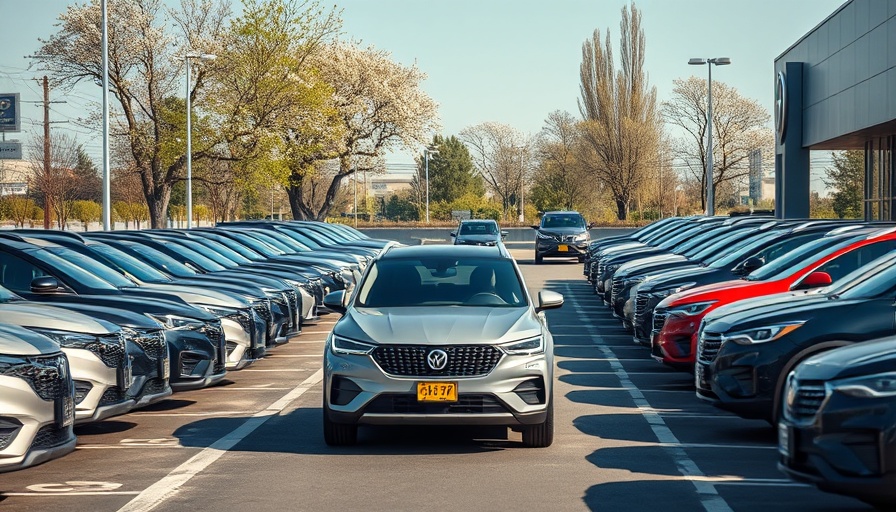
The Surge in U.S. Vehicle Sales: A Response to Tariff Fears
In recent months, the U.S. automotive market has witnessed a dramatic increase in vehicle sales, with new car purchases soaring over 17% in March alone compared to February. This sudden spike reflects consumers' urgent efforts to beat anticipated price increases due to new tariffs imposed on imported vehicles and parts.
Akio Miller and his wife are just one example of the many buyers rushing to dealerships. Living in suburban Detroit, the Millers are test-driving models like the Hyundai SUV, aware that waiting any longer could result in paying significantly more. As Akio expressed, "With everything going on with the up and down with the tariffs and the car prices... we need to probably look sooner than later." For families like theirs, the looming tariffs signify not just a price hike but a profound change in the accessibility of necessary vehicles.
Understanding the Current Sales Trends
According to Cox Automotive, the push to purchase ahead of tariff implementations has left dealer inventories dwindling by about 10%, and the sales data suggests this is more than a passing trend. Sales rose dramatically in March, a month before tariffs took effect on April 3, marking the highest sales figures for some manufacturers.
However, a recent report from S&P Global Mobility presents a sobering forecast. It estimates that if the tariffs remain unchanged for the next few years, overall U.S. vehicle sales are expected to plummet by up to 700,000 units in the coming year. "You got a lot of sales in March that were basically people buying ahead of the tariffs," noted economist Patrick Anderson, indicating a potential slowdown in future purchases as consumers fill their immediate needs.
The Implications of Tariffs on Price Structures
The idea of a 25% tariff on imported vehicles and auto parts has raised significant concerns among buyers and dealers. Many, like George Glassman, who operates multiple dealerships in Michigan, predict that the changes will lead to immediate price increases once the tariffs are fully enforced. Glassman stated, "No doubt, it would go up. The question is, to how much it would go up." Cars such as the Hyundai Ioniq 6, which relies heavily on imported parts, will likely see a steep increase in price, further straining buyer budgets.
A Ripple Effect on the Automotive Market
The implications of these tariffs extend beyond just immediate sales and price hikes. The ongoing uncertainty may affect not only consumer sentiment but also automakers' planning and production strategies. With many manufacturers now considering adjustments to their supply chains, the landscape of the U.S. automotive market could face substantial transformations in response to these tariffs.
It is important to note that the Trump administration has suggested providing some relief to U.S. automakers by exempting them from certain tariffs on steel and aluminum, which could partially mitigate impending price increases. Nonetheless, the automotive landscape still faces challenges as consumers weigh the benefits of purchasing now against the potential future cost.
Looking Ahead: What Consumers Should Consider
The current surge in vehicle sales brings forth essential considerations for prospective buyers. Consumers must remain informed and proactive if they wish to secure what might soon be rarer and more expensive options. Here are a few strategies they can implement:
- Stay Informed: Keep abreast of tariff updates and market conditions. Understanding the broader economic context can aid in making timely purchasing decisions.
- Explore Financing Options: With rising vehicle prices, buyers might explore various financing options that can help manage costs over time.
- Consider Timing: As dealer inventories fluctuate, it may prove beneficial to act quickly before stock is depleted further.
The Broader Economic Landscape
This automotive tariff scenario highlights larger national issues regarding trade policies and market stability. As the U.S. navigates this turbulent economic landscape, consumers are left to grapple with the challenge of making informed choices. Ultimately, staying ahead of tariff implementations is crucial, but consumers must also consider their long-term financial and transportation needs.
In conclusion, as U.S. vehicle sales experience unprecedented shifts, it is imperative for buyers to act swiftly while remaining conscious of the broader market implications. The uncertainty surrounding tariffs emphasizes the need for informed decision-making in a rapidly changing economic environment.
 Add Element
Add Element  Add Row
Add Row 



Write A Comment